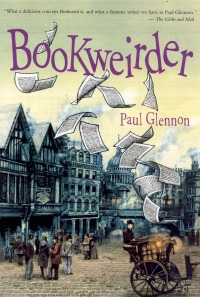| ________________
CM . . .
. Volume XVII Number 5. . . .October 1, 2010 
 |
Bookweirder.
Paul Glennon.
Toronto, ON: Doubleday Canada, 2010.
246 pp., pbk., $14.95.
ISBN 978-0-385-66548-3.
Grades 5-8 / Ages 10-13.
Review by Vikki VanSickle.
*** /4
Reviewed from Advance Review Copy.
|
| |
|

excerpt:
Norman had no idea how the bookweird worked, how you got from one book to another. It had started for him when he'd accidentally eaten a page of The Brothers Lochwarren and fallen into the world of Undergrowth. Fuchs had called this his ingress. Eating book pages had side effects. It was contagious. It caused things to move from book to book.
When Norman escaped Undergrowth something else escaped with him. The wolves that hunted him in Undergrowth pursued him into Dora's horse book, Fortune's Foal, killing a horse and nearly wrecking the book completely. It was as if his ingress created doorways between books. When he fell into that New York alleyway in The Magpie, he accidentally brought a horse with him. He'd never thought of what might have been displaced from The Magpie when he escaped. . .until now.
Norman is not having a great summer. Stuck in the English countryside with his family and left to his own devices, he stumbles upon a series of old adventure books, called The Intrepids, in which three plucky British children, George, Pippa, and Gordon, attempt to prove the innocence of George's father who is being imprisoned for a crime he did not commit. Along the way, the trio solve mysteries and get involved in the kind of escapades one might expect from an Enid Blyton or Arthur Ransome novel.
But Norman is not an average reader... he has the ability to tap into something called bookweird, which allows him to enter the world of the book he is currently reading, simply by chewing on its pages. In Bookweird, Glennon's previous novel, Norman found himself defending a community of talking stoats from an evil empire of wolves, befriending Martin, the stoat king, along the way. In Bookweirder, Norman is shocked to discover that Martin has somehow fallen out of his story and into the world of The Intrepids, along with his friend, Fuchs, the only person he has known in the real world who can also access the bookweird, and a mysterious and dangerous criminal.
Norman is determined to help the Stoat King get back to his own book, but complications arise. Fuchs is posing as solicitor Mr. Todd and has taken up residence in the world of the Intrepids. When Norman discovers that he may be in cahoots with the poacher, seeking a map that may be the key to the Bookweird phenomenon, he starts to question his friend's motives. But perhaps the strangest thing is the behaviour of Norman's mother, Meg, who has become suspicious of Norman's reading activity and demands detailed plot summaries of the very books he has fallen into. Could it be that Norman is not the first member of his family to use the bookweird?
The addition of the family history, particularly of Norman's mother and his missing Uncle Kit, who turns out to be the duplicitous Fuchs/Todd character, adds a nice layer of complexity to Glennon's high-spirited fantasy tale. Martin, the stoat king, is a lovable character, though The Intrepids, themselves, (Pippa, George and Gordon) are a little flat. This is not a character-driven novel; Glennon's strength is his writing.
Glennon is a very traditional writer. His concept, characters and writing style feel like an homage to classic fantasists and adventure writers, such as Arthur Ransome, Enid Blyton and Phillipa Pearce. This will endear him to voracious readers and lovers of fantasy, but it may not be enough to hook those who are more on the reluctant side. There are also some juicy sections for fans of historical fiction, as Glennon draws on characters and settings from a variety of periods in British history.
Bookweirder takes a while to get going, but once it does, it's an engaging tale with more than a few nods to classic novels. Bookweirder, and its predecessor, Bookweird, fit firmly in a niche of books about books, a classic example being Michael Ende's fantastic and creepy Neverending Story, and more recently, Cornelia Funke's Inkheart series and James Bow's Unwritten Books series. In these books, characters find themselves falling into literary worlds, real or imagined, an appealing concept for bookworms of all ages. The end of Bookweirder provides more questions than answers, setting the reader up for a third book in the series. Bookweirder will appeal to fans of Endymion Spring, the Unwritten books, and Swallows and Amazons.
Recommended.
Vikki VanSickle has an MA in children's literature from the University of British Columbia. She is the manager of the Flying Dragon Bookshop and the author of Words That Start With B, a middle grade published by Scholastic Canada.

To comment
on this title or this review, send mail to cm@umanitoba.ca.
Copyright © the Manitoba Library Association. Reproduction for personal
use is permitted only if this copyright notice is maintained. Any
other reproduction is prohibited without permission.
NEXT REVIEW |
TABLE OF CONTENTS FOR THIS ISSUE
- October 1, 2010.
AUTHORS |
TITLES |
MEDIA REVIEWS |
PROFILES |
BACK ISSUES |
SEARCH |
CMARCHIVE |
HOME |
